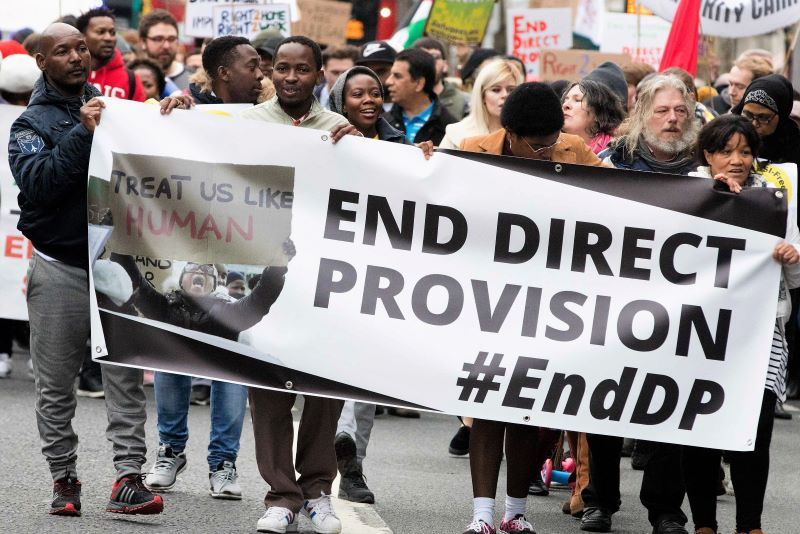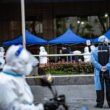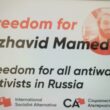The Socialist spoke to Emine Ertas, a Kurdish asylum seeker from Turkey, about her experiences as an asylum seeker here in Ireland, and particularly her experiences of living within the system of Direct Provision.
What is the situation like in your home country of Turkey? What forced you to leave?
Turkey is a beautiful country but for whom? I am a Kurdish and socialist woman but as Kurds, we have been suffering a lot for a long time. We still do not have our identity and cultural rights as a different ethnicity living in Turkey although we have struggled together in several battles. Today in the Kurdish language and literature departments of universities, to write a Kurdish thesis is still impossible. Kurdish political parties, plays, and music have been under a ban. We are oppressed all the time, not just only cause we are Kurds but also because we traditionally live in the poorest part of Turkey, the East.
Racism has always been a powerful instrument, especially for the capitalist class. An assimilation policy is very dominant in the state, especially in education. After Recep Tayyip Erdogan and his party the AKP came to power, we lost all rights that we had struggled for them before. Kurdish media were closed and then many politicians and intellectuals were forced to leave the country. My husband and I were forced to leave because of similar suppressions.
The country became a dictatorship. Today it is so hard to say that Turkey is a Republic; the regime is completely turned to political Islam. The president of Turkey can arbitrarily bring any new policies and laws by amending the constitution. It is near to impossible to live under these rules for most people, but especially for those who are socialist and have secular lifestyles. Under neo-liberal policies, we faced more of a capital-friendly government and dictatorial state. For the working class, life became dark and reactionary.
We cannot speak freely, and for my husband Cagdas, a journalist and writer, you can imagine how difficult it is. In Turkey journalism is the most dangerous job. The government always threatens opponents that if they want to speak up they will pay for that either by defamation cases or by becoming unemployed or imprisonment. Cagdas received many threats because of his articles and newspaper reports. Always we were living in fear because we were aware the state was just biding its time, waiting to harm us.
I do not remember a day when we were not under pressure in Turkey. A friend of ours was killed in the Ankara ISIS attack, and another one in the Suruc, Urfa attack, also by ISIS. Some of our friends were also imprisoned because of their political views and some had to leave Turkey. Cagdas’ colleague said to him if that he wanted to continue his work, he had to go abroad. That’s when we understood he was right and decided to leave. The colleague is in Germany now, and we are in Ireland.
Unfortunately, the fascist military coup that took place in 1980 has been continued under the AKP and Erdogan era. At the point we arrived, the Republic was destroyed and people are under the wreckage. Unfortunately, dark days and poverty await Turkey, which has lost its secular values and social rights. To be able to speak up and continue our struggle we are here now.
How long have you spent in Direct Provision? What are some of the difficulties of life there?
We have been living in Direct Provision for nearly 3 years. It has many difficulties, but I think the most stressful thing is the isolation from social life, the lack of language education and the long refugee process (for some it’s 10-14 years). Although I studied English language and literature and my husband is a journalist and writer, integration into Irish life was difficult.
Actually, refugees are like slaves bound in invisible chains, and we often live in oppression and fear, as we have so much to lose besides our chains. There is no serious language education for adults because asylum seekers/refugees are supposed to be limited to unqualified jobs. But what if a refugee is a writer, and all job opportunities depend on learning the language? We have hardly any alternative to learn the language professionally, apart from highly-paid language schools. Education is a social thing and self-learning is nothing but a huge marketing lie. From now on, we inescapably need an unshakable and humane system.
Aside from these difficulties, what do you think about Ireland?
Ireland has always been a conscious choice for us. The struggle of the Irish against British imperialism and their republican ideas bring us historically closer to this country. James Connolly’s ideals of the workers’ state have always excited us. The development of this country on such foundations also sheds a meaningful light on our future. When I look at Ireland I see Oscar Wilde and Connolly and Larkin. Irish people and especially the working class will be in solidarity with us because we know the Irish have a memory and history of migration. So, I think we can express our thoughts about Ireland better in our works by looking through the eyes of the people who carry the country on their shoulders.
In your opinion, what would a more humane system for refugees look like?
With Direct Provision, we are talking about a system where someone earns big profits and private companies only prioritise their profit. How can a profit-oriented system be humane and good? A person does not exploit simply because they are a bad person; capitalism has to exploit by its nature, so it makes people bad. That’s why we say end Direct Provision right now.
We live in a caste system that transcends class society. We are asked to follow a series of invisible lifelines. Refugees or immigrants are seen like ghosts or like the plague-stricken in society.
The definition of humans is that it we are a biological, psychological, social, and cultural being. If we exclude the social aspect of the human being, then we reject the freedom of humanity and the values in the definition of humanity. That’s why social houses have to be built for all and refugees should have access to an adult education program. It means the integration can be easier and less painful as we can be seen as an individual, neighbor and friend by society.
Direct provision is only a part of the capitalist system.
My husband and I dream of a good future for all workers in Ireland. Homelessness in Ireland is very serious and the homeless are suffering a great tragedy. When faced with such serious problems, it should be questioned that companies are making millions of euros in profits. It shouldn’t be forgotten that every created inequality causes big problems. We cannot expect unhappy people to leave a better heritage for the future.










